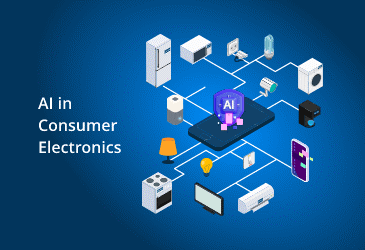AI-Driven Consumer Electronics The Future of Home Tech Artificial Intelligence (AI) is no longer a futuristic concept; it’s now an integral part of consumer electronics. From smart home devices to AI-driven wearables, the integration of AI is transforming the way we interact with technology. This article delves into the latest AI-driven consumer electronics products for
AI-Driven Consumer Electronics The Future of Home Tech
Artificial Intelligence (AI) is no longer a futuristic concept; it’s now an integral part of consumer electronics. From smart home devices to AI-driven wearables, the integration of AI is transforming the way we interact with technology. This article delves into the latest AI-driven consumer electronics products for 2024, highlighting how these innovations are shaping the market and enhancing the consumer experience.

Yandex.com
- The Rise of AI in Consumer Electronics
AI has permeated nearly every aspect of consumer electronics, driving innovation and creating more intuitive, responsive, and personalized devices. The rapid advancement of machine learning, natural language processing, and computer vision has enabled manufacturers to create smarter products that cater to individual user needs. This section explores how AI has evolved in the consumer electronics space and its impact on product development.
- Key Trends in AI-Driven Consumer Electronics for 2024
As we move further into 2024, several key trends in AI-driven consumer electronics are emerging. These trends are setting the stage for new product launches and influencing consumer expectations.
2.1 Enhanced Personalization
One of the most significant trends in AI-driven consumer electronics is enhanced personalization. AI algorithms analyze user data to customize experiences, whether it’s adjusting smart home settings based on daily routines or providing tailored content recommendations on streaming devices.
2.2 Voice-Activated Devices
Voice-activated devices continue to gain traction, with improvements in natural language processing making interactions more seamless. From smart speakers to AI assistants embedded in smartphones and TVs, voice-activated technology is becoming a standard feature in consumer electronics.
2.3 AI in Wearables
Wearable technology is becoming increasingly sophisticated, with AI driving innovations in health monitoring, fitness tracking, and even mental wellness. AI algorithms in wearables can now detect anomalies in health data and provide real-time feedback to users, making these devices indispensable for health-conscious consumers.
2.4 AI-Powered Home Automation
AI-powered home automation systems are becoming more advanced, integrating multiple smart devices into cohesive ecosystems. These systems can learn from user behavior and optimize energy consumption, enhance security, and improve overall convenience in the home.
- Spotlight on AI-Driven Consumer Electronics Products for 2024
2024 is witnessing the launch of several groundbreaking AI-driven consumer electronics products. Below is a closer look at some of the most anticipated releases.
3.1 Smart Home Devices
Product Example: Google Nest Hub Max 2nd Generation
The latest iteration of Google’s Nest Hub Max integrates advanced AI to offer more personalized home automation. It features facial recognition, gesture controls, and AI-driven routines that adjust lighting, temperature, and security settings based on user preferences.
3.2 AI-Enhanced TVs
Product Example: Samsung AI Neo QLED 8K TV
Samsung’s latest AI-enhanced Neo QLED 8K TV utilizes AI-driven upscaling to deliver ultra-high-definition content. The AI algorithms analyze each scene in real-time, optimizing brightness, contrast, and color accuracy, providing a viewing experience that rivals professional cinema quality.
3.3 AI Wearables
Product Example: Apple Watch Series 9
The Apple Watch Series 9 leverages AI to offer advanced health monitoring features. It can detect irregular heart rhythms, monitor blood oxygen levels, and even analyze sleep patterns. The AI-powered health insights make it a comprehensive wellness device.
3.4 AI-Powered Audio Devices
Product Example: Sony WH-1000XM5 Noise-Canceling Headphones
Sony’s WH-1000XM5 headphones use AI to adapt noise-canceling levels based on the environment. The AI-driven sound enhancement technology also personalizes audio profiles, ensuring optimal sound quality tailored to the listener’s preferences.
- Comparative Analysis of AI-Driven Consumer Electronics
The table below provides a comparative analysis of the AI-driven consumer electronics products highlighted in this article.
| Category | Product | AI Features | Market Impact |
| Smart Home Devices | Google Nest Hub Max 2nd Gen | Facial recognition, gesture controls, AI-driven routines | Enhances home automation, improves personalization |
| AI-Enhanced TVs | Samsung AI Neo QLED 8K TV | AI upscaling, real-time scene optimization | Sets new standards for home entertainment, boosts TV sales |
| AI Wearables | Apple Watch Series 9 | Health monitoring, AI health insights | Dominates the wearables market, appeals to health-conscious users |
| AI-Powered Audio Devices | Sony WH-1000XM5 Headphones | Adaptive noise-canceling, AI sound enhancement | Redefines audio quality, strengthens Sony’s position in audio tech |
- Analysis of AI Consumer Electronics Market
As AI continues to evolve, its application in consumer electronics is expanding, driving market growth and influencing consumer behavior. This section analyzes the current state of the AI-driven consumer electronics market, focusing on the opportunities and challenges faced by manufacturers and consumers alike.
5.1 Market Growth and Opportunities
The AI-driven consumer electronics market is poised for significant growth, driven by increasing consumer demand for smarter, more intuitive devices. Manufacturers are investing heavily in AI research and development to stay competitive. The growing adoption of AI in emerging markets also presents a substantial opportunity for expansion.
5.2 Challenges in AI Adoption
Despite the promising outlook, there are challenges in the widespread adoption of AI-driven consumer electronics. Privacy concerns, data security issues, and the high cost of AI technology are some of the barriers that manufacturers need to address. Additionally, the complexity of integrating AI into consumer products requires ongoing innovation and collaboration across the tech industry.
- The Future of AI-Driven Consumer Electronics
Looking ahead, the future of AI-driven consumer electronics is bright, with continued advancements expected in the coming years. AI will likely become more integrated into everyday devices, making technology even more accessible and user-friendly. The key to success for manufacturers will be balancing innovation with privacy and security considerations, ensuring that consumers can trust and rely on their AI-powered devices.
Analysis Table
| Factor | Details |
| Market Size | Expected to reach billions of dollars, with a CAGR of around 20% over the next few years |
| Consumer Demand | High demand for personalized, intuitive devices across various consumer segments |
| Key Players | Apple, Samsung, Google, Sony, among others |
| Opportunities | Emerging markets, AI innovation, smart home integration |
| Challenges | Privacy concerns, data security, high R&D costs, integration complexity |
Comparative Table
| Product Category | AI Features | Consumer Benefit | Price Range |
| Smart Home Devices | AI-driven routines, facial recognition | Enhanced home automation, energy efficiency | $200 – $300 |
| AI-Enhanced TVs | Real-time scene optimization, upscaling | Superior viewing experience | $1500 – $3000 |
| AI Wearables | Health insights, sleep analysis | Comprehensive health monitoring | $399 – $599 |
| AI-Powered Audio Devices | Adaptive noise-canceling, sound enhancement | Personalized, high-quality audio | $350 – $450 |
-
Conclusion
AI-driven consumer electronics are revolutionizing the way we interact with technology. The products released in 2024 demonstrate the incredible potential of AI to enhance personalization, improve user experiences, and drive innovation in the tech industry. As AI continues to evolve, it will undoubtedly play an even more significant role in shaping the future of consumer electronics.
















